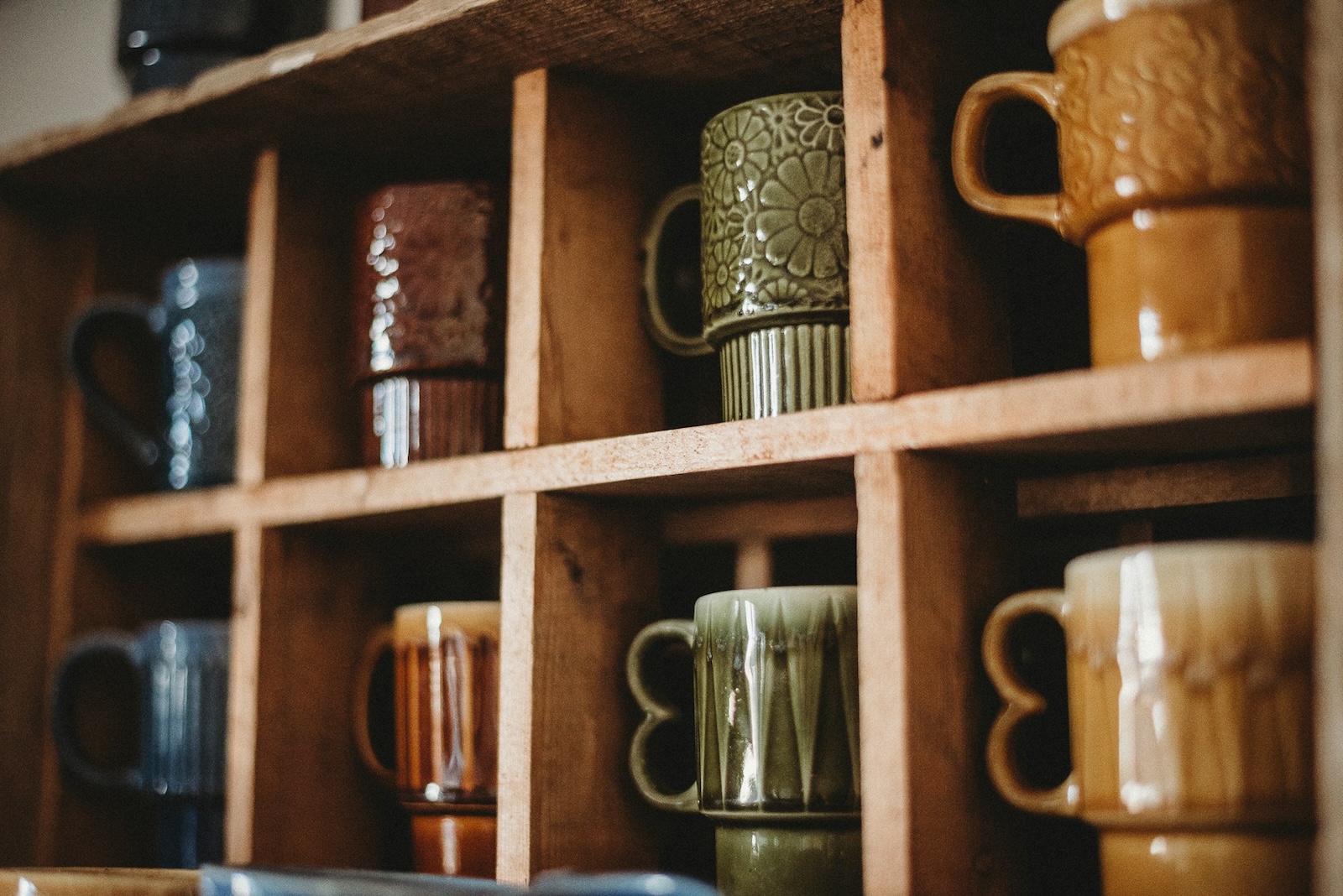Country Mouse and City Mouse by Katherine Riegel

For Carolyn
1. One of us thinks too little about weight. One of us thinks too much. She is all angles, like the drawings of women in pattern catalogs at the fabric store. I am all rounded: my chin, my stomach, my upper arms like still life paintings of plump, ripe fruit. My particular mental and physical health means I use sweets as a crutch—some kind of pleasure to look forward to, a sugar jolt to give me enough energy to get up off the couch.
2. We met in college. I don’t remember which class—fiction writing, where she was always a better writer? A literature class, where the professor had posted the reading list ahead of time and I read the books in between fetching monographs as a library page over winter break, making her think I was a kiss-ass? We talked writing and boys and had decadent coffee drinks at a little café on the edge of campus.
3. I was so earnest. My mother thought sarcasm was always cruel, and my father’s humor was puns and shaggy dog jokes. She regaled me with tales of everyday life and threw her head back to laugh, and I learned that not all sarcasm was cruel. Sometimes I didn’t understand why something was funny and felt like a hick, a bumpkin, my legs turning to roots that yearned for the countryside soil where I’d grown up. Even now, at cafes where you have to give your name, she says something like “Kiki” or “Veronica,” while I would tell them my address as well as my name if asked for it.
4. I was not a hick, but I didn’t know it. My father worked in administration at the university we attended. My mother had a college degree. Our bookshelves were filled with everything from Frances Hodgson Burnett to Keats, Silent Spring to All Creatures Great and Small. We had horses but no farm animals for food. We were, I later learned, privileged, even though my mother bought generic toilet paper and cereal in those white boxes with army green stripes that announced to the clerk you were poor. She did that because my father worried about money constantly. His worry, I’d also later learn, was outsized, irrational.
5. Her anxiety flashed and pulsed, electric shocks through her system that she didn’t show because she was so used to the pain. I saw her as a firefly, her wit a brilliance illuminating the dusk. We went to parties and talked them through afterwards, the post-party wrap-up more important than the party itself. Once she had to pull me aside and tell me the boy I was flirting with was hers, she’d been working on him for half an hour. Her flirting was so much more subtle than mine that I hadn’t even seen it, understated so she wouldn’t feel vulnerable if he didn’t ask for her number. Mine was a too-wide smile, a touch on his arm or a playful shove or even a risqué remark, obvious as a cartoon character.
6. How can it have been more than 35 years we have known each other? Through times when calling long distance cost too much so we wrote letters to each other; through boyfriends and breakups; through a variety of states, though always on the east side of the Mississippi River. My first husband running around her coffee table with her toddler, both of them singing Bob the Builder; I’d always known I didn’t want children. Her taking the train down to that same college town when my sister was dying, meeting me there with fancy chocolate in her bag and handing it to me as we hugged. Picking her up at a small airport in Alabama so we could go to a conference where she’d charm my friends and colleagues. Forgetting and remembering years-ago events, scenes of our times together swimming up through the dark unpredictably.
7. I have always been slower: I read at a normal speed, but she’s a speed-reader, finishing long articles in less than ten minutes. She remembers names and details that I never even notice, sunk in my own processing of a world too loud and too all-at-once for me. She does hot yoga and covers city sidewalks with long strides. I am a snail, a chronic illness having transformed me at 21 and slowing me more each year. I concentrate on pushing one leg forward, planting one aching foot, swinging the other leg. I breathe hard.
8. People from Chicago sound nasal to us down-staters, often gruff, and they speak too quickly. She grew up in a suburb, but she was always Chicago, loving the diversity and energy of the city, the art and culture, the public transportation. I had a hint of the downstate rural accent, but my parents were from Pennsylvania and Washington, D.C. We said “roof” with the oo-sound of “move,” and “PAR-muh-zhan” rather than “par-ME-zhan.” When we went on long drives east to visit relatives or west to see the mountains, my father’s hands strangled the steering wheel every time we approached a city; he bellowed at our mother with the road atlas on her lap, the traffic and the smell of exhaust from so many cars like a cattle prod on the bull of him. His anxiety became mine, conjured by the sense overwhelm of a city.
9. I have always loved the literary concept of foils: two characters so different from one another that, juxtaposed, each character’s qualities seem even more pronounced. Jack Sprat and his wife. The tortoise and the hare. Introvert and extrovert. Fear of concentrated populations—more people to hurt me—and fear of isolation in an empty landscape. City mouse and country mouse.
10. When we graduated, our kindest professor had a small party at his house for his favorite creative writing majors. His wife made hors d’oeuvre and their toddler looked up at us like we’d look up at giraffes in the zoo. When we left, our professor hugged us both, a continuation of the support he’d given us as fledgling writers over our undergraduate years. As we drove away, she told me she’d imagined me reaching down and grabbing his butt during the hug, and she crossed her arms and made squeezing motions with her fingers. I said, “But I didn’t! I would never!” and she laughed and laughed, her wildest cackle. She still tells people this story, and I watch their eyes, trying not to protest so much that they start to believe her fiction. We are a team, me the straight man, our audience chuckling and shaking their heads, knowing this is really about our relationship, the two of us, best friends, foils.
 Katherine Riegel’s memoir, Our Bodies Are Mostly Water, is forthcoming from Cornerstone Press in 2025. Her books include Love Songs from the End of the World and Castaway. Her work has appeared in Brevity, Catamaran, Orion, and elsewhere. Co-founder of Sweet Lit, she teaches online workshops. Find her at katherineriegel.com
Katherine Riegel’s memoir, Our Bodies Are Mostly Water, is forthcoming from Cornerstone Press in 2025. Her books include Love Songs from the End of the World and Castaway. Her work has appeared in Brevity, Catamaran, Orion, and elsewhere. Co-founder of Sweet Lit, she teaches online workshops. Find her at katherineriegel.com
